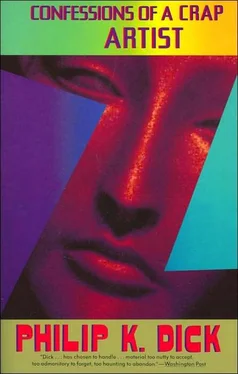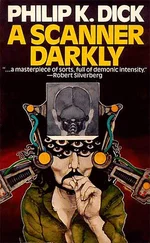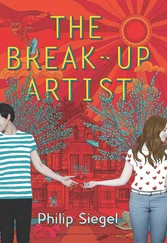Fay stood watching, her arms folded. “I’ll go get a coat,” she said. To the girls, she said, “You both get your coats.”
The girls scampered back into the house.
To Fay he said nothing. He got into the car, behind the wheel. She did not join him; she waited for the girls. As she waited she got her cigarettes from the spot at which she had left them, lit up, and did a little more digging.
The howling of the children made him weary. Everywhere kids raced and screamed, in and out of the bright, newly-painted storybook buildings that made up the Oakland Park Department’s idea of Fairyland. He had parked quite far from it, not being sure exactly where it was, and the walk alone had worn him out.
Bonnie and Elsie appeared at the bottom of a slide, waved at him and Fay, and scurried to join the other children at the stairs leading back up.
“It’s nice here,” Fay said.
In the center of Fairyland, Little Bo Peep’s lambs were being fed from a bottle. A middle-aged woman’s voice, amplified by loudspeakers, told the children all to come running to see.
“Isn’t that funny,” Fay said. “We come all the way down here to see lambs being fed. I wonder why they feed them from bottles. I guess they think it’s cuter.”
After the girls had finished with the slide they wandered on. Now they had found the wishing well and were fooling with it; he only vaguely noticed them.
Fay said, “I wonder which is Fuddle’s castle.”
He didn’t answer.
“This is tiring,” she said. “I guess you already had enough for one day.”
Presently they arrived at the refreshment stand. The children had orange drink and hot dogs. Just beyond that they saw the ticket window and station house of the little train. Its narrow track ran into and out of Fairyland, passing among the trees beyond. On their way to Fairyland from the car they had noticed the track; in fact they had followed it to the main gate of Fairyland, which of course was on the opposite side from them. They had had to walk all around it.
As they had tramped along, looking in vain for the gate, Fay had said to him, “You know, you’re a schlimozl.”
“What’s that?” both girls had demanded.
Fay said, “A schlimozl is a person who always gets up to the ticket window at the ballpark just as the last bleacher seat is sold. And he doesn’t have enough money with him to buy a reserved seat.”
“That’s me,” he said.
To the girls, Fay explained, “You see, he parked on the opposite side from the entrance, and we had to walk all around. Now, if I had been driving I would have parked and we would have gotten out, and there we would have been. Right at the entrance. But a schlimozl always has bad luck. It’s an instinct with him.”
Yes, he thought. It’s true about me. There is a bad luck that gets me into things that I don’t want to be in, and then it keeps me there. It holds me there. And nothing that I do can get me out.
“It’s just my luck,” Fay said, “to marry a schlimozl. Maybe our luck will balance out, though.”
Now, he stood with her and the children, lined up to buy tickets for the little train. His legs ached and he wondered if he could live through it, the waiting in line for tickets and then, after getting tickets, the waiting for the train to return and take on passengers. At this moment the train was off somewhere in the park, out of sight. A whole raft of children, who had already gotten tickets, waited eagerly on the platform beyond the ticket window.
“It’ll take at least half an hour,” he said to Fay. “Is it worth it?”
Fay said, “This is the main event. Isn’t this what we saw them all doing? They have to ride on it.”
So he waited.
Alter a long time he was able to reach the ticket window and buy tickets for the four of them. Then he and Fay and the girls pushed on to the platform. By now the train had returned; children and their parents were spilling out of it, and the conductor was pointing the way out. A new load ran to the cars and began to board. The cars were small and irregularly-shaped. The occupants’ heads were forced almost to bump, as if by entering the car they became ancients nodding and dozing.
“In a way this Fairyland is a disappointment,” Fay said. “1 don’t think they give the children enough to do; they can’t actually go into those little houses—all they can do is look at them. Like a museum.”
His weariness and lethargy kept him from commenting. He no longer felt related to the noises and movement around him, the swirl of children.
A conductor came along the platform, collecting tickets. He counted aloud. When he reached Nathan he stopped, saying, “Thirtythree.” Then he took Elsie’s ticket and said to Nathan, “Are you all together?”
“Yes,” Fay said.
“Well, I hope I can squeeze you all in,” he said, taking her ticket and Bonnie’s and Nathan’s.
“How many can you get in?” Fay said.
“It depends on the number of adults,” the conductor said. “If it’s mostly kids we can keep squeezing them in. But an adult is another matter.” He departed with the tickets.
“I guess we get in,” Fay said. “He took our tickets.”
Theirs had been the last tickets collected. Behind them, a family of five fretted and worried.
They won’t get on this time, Nathan thought. They’ll have to wait. He gazed off past the refreshment stand at the sturdy house that the third little pig had built.
When the train returned, he and Fay and the children moved with the others through the gate and onto the outer platform, along the track. As the cars became empty the new passengers clambered on. The conductor began shutting the wire doors of the cars. At the gate, the family with tickets were stopped. “No,” the attendant said. “You can’t get on if you have tickets.”
How weird, Nathan thought, seeing a small boy whose ticket had not been collected standing hopefully at the train, holding his ticket up. Here, if you have a ticket, you’re barred. If you don’t, then you can get on. The girls and Fay hurried toward the rear car, along with the others. His feet dragged; weighed down, he fell behind them. Children squeezed past him and hopped up into the cars.
When he arrived at the last car he found that Fay and Elsie had already found places. The conductor started to close the wire door, and then seeing Bonnie, said to her.
“Room for one more.”
Lifting her up, he handed her to Fay, inside the car.
Around Nathan, the other children without tickets disappeared into the cars. Only a few remained, and then only he remained on the platform. Everyone had been seated but him. The wire door on Fay’s car had been locked, and the conductor was starting away. Suddenly seeing him, the conductor said,
“I forgot about you.”
Nathan found himself smiling. Behind him, beyond the gate, the waiting people waved and shouted with sympathy. Or was it sympathy? He did not know. He found himself walking along with the conductor, back up the length of the train, toward the engine. The conductor prattled away, telling him how he had happened to overlook him. At the first car the conductor peered in and then said,
“Here. You can get in here.”
He clambered up, pushed through the little entrance, and found himself facing four Cub Scouts in blue uniforms. They stared at him as he tried to seat himself on the bench. At last he said to the first Cub Scout, “Why don’t you move over?”
The scout at once moved, and he was able to seat himself. His head brushed the roof of the car, and the angle was such that he had to hunch forward. He sat no taller than the scouts; only larger, more awkward, filling up more space—as the conductor had said. The wire door was locked and then the conductor signalled to the motorman.
Читать дальше










